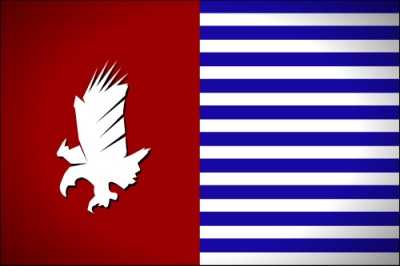Ganzabar
The Ganzabar Federation is a large, industrious nation in the south. To the north of it is Azrune & the Nezzu Strait and to the east and south are various small scattered city-states. To the west lies the Lystrata Commonwealth.
The capital is Zaropolis, and its currency is the Hemmark, although the Floril is also heavily used in trade. The first language is Azbuka, with the Ganzabi Accent; Baseeq is a widely spoken secondary language, particulaly in the west. Ganzabar's national animal is the Ruby Falcon, appearing both on the flag and many state emblems.
The large and influential Church of Gnost is a central part of Ganzabi culture. The term "Ganzie" is a common colloquial term for someone from Ganzabar, although it is often pejorative. The correct noun would be "Ganzabi".
History
Ganzabar's origin stems from a violent uprising in the central industrial quarters of old Azrune during the late days of The Collapse. A number of large corporations formed a co-operative union named the Zabur Alliance. The conglomeration was the first breakaway from Azrune of its scale, and set the conditions for the First Nation's gradual decline.
The Zabur Alliance eventually came under the control of Magnus Valor, who reformed it into an authoritarian empire. After some hundred years of intense unrest, Valor's regime was overthrown by a coup that instated a democratic government. The movement's leader, Gan Fellowhall, was so inspirational to the new nation that they took his name in forming a new one: Gan's Zabur. In time, this became Ganzabar.
Regions
Ganzabar is split into a number of territories and provinces. These are:
- District of Zabur
- Quanduro Province
- Hetter Province
- Savok Province
- Pontuck Province
- Abbert Province
- Luft Province
- Notam Province
- Philamor Province
- Teecass Province
It also commands control of other areas such as the Brazak East Semi-Autonomous Zone.
It has a protectorate: the Republic of Capridor.
Cities and People
Ganzabar's settlements include:
Ganzabar's largest ethnicity is Hal, followed by Aquitano, Ziothi and minorities of Meedish and Svalic. However, while this may be true of the population as a whole, the Ziothi and Aquitano make up a much larger proportion of the ruling class than the Hal; of which the majority are of working class.
